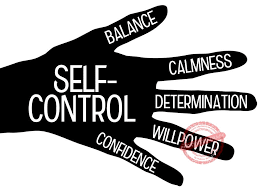SELF CONTROL
WHAT IS SELF CONTROL
People
use a variety of terms for self-control, including discipline, determination,
grit, willpower, and fortitude.
Psychologists typically define self-control as:
The ability to control behaviors in order to avoid temptations
and to achieve goals
The ability to delay gratification and resist unwanted behaviors
or urges
A limited resource that can be depleted
Still,
some researchers believe that self-control is partly determined by genetics,
with some just born better at it than others.
IMPORTANCE OF SELF CONTROL
Self-control
and achievement
Being
high in controlling our desires and impulses is important in achieving the
goals we set for ourselves. While it is reasonable to assume that those higher
in self-control would have higher grades, research has in fact found
self-control to outdo even intelligence in predicting good academic
performance. This is mostly because young people high in self-control spend
more time doing their homework, have higher school attendance, focus in class
more, and have higher grades
Self-control
and well-being
Self-regulatory
skills also predict reduced stress and increased well being. Hoffman et al.
(2014) found that people with more self-control feel happier and are gladder
about their life. This is partly because of lower emotional distress and
avoiding difficult emotional conflict that comes with giving in to tempting
impulses.
Emotional
awareness is key in this process. Self-control doesn’t entail disregarding
emotional responses, but on the other hand depends on the information provided
by emotional awareness, including identifying our emotions as well as
understanding why we feel the way we feel. This awareness has been found to be
associated with depression and well-being both directly and indirectly, by promoting
emotion regulation and self-control
HEALTH BENEFITS
Self-control
is also important for maintaining healthy behaviors. What you eat for
breakfast, how often you work out, and whether you have a consistent sleep
schedule are all decisions that can be impacted by your levels of self-control
and have the potential to affect your health.
Researchers have found that self-control can have a number of
potential influences on health and well-being. One longitudinal study found
that adults who had greater self-control in childhood were less likely to have:
Substance dependence or addiction to tobacco, alcohol, or
cannabis
Sexually transmitted infections
Elevated inflammation
Periodontal disease
Airflow obstruction
Metabolic abnormalities
The belief that self-control alone can help us reach our goals can lead to people blaming themselves when their health is influenced by factors beyond their control. It may also lead to feelings of learned helplessness where people feel that they cannot do anything to change a situation
While research suggests self-control has its limitations, psychologists have also found that it can be strengthened with certain strategies:
AVOID TEMPTATION
This is an effective way of making the most of your available
self-control. Avoiding temptation ensures that you do not "use up"
your available self-control before it is really needed. Whether it's the desire to eat, drink, spend, or indulge in
some other undesired behavior, one way to avoid temptation is to find a healthy
distraction. Go for a walk, call a friend, throw in a load of laundry, or do
whatever it takes to get your mind off the thing that is tempting you at the
moment.
PLAN AHEAD
Consider
possible situations that might break your resolve. If you are faced with
temptation, what actions will you take to avoid giving in? Research has found
that planning ahead can improve willpower even in situations where people have
experienced the effects of ego depletion.
For
example, if you are trying to reduce your sugar intake and you have a hard time
controlling those late afternoon snack attacks, eat a well-balanced lunch
packed with plenty of fiber, protein, and whole grains that will keep you full
longer.
PRACTICE USING SELF CONTROL
While your control might become depleted in the short-term, regularly
engaging in behaviors that require you to exert self-control will improve your
willpower over time. Think of self-control as a muscle. While hard work
may exhaust the muscle in the short-term, the muscle will grow stronger over
time as you continue to work it.
FOCUS ON ONE GOAL AT A TIME
Setting a lot of goals at once is usually an ineffective
approach. Depleting your willpower in one area can reduce self-control in other
areas. It is best to choose one specific goal and focus your energy on it.
Once you turn the behaviors needed to reach a goal into habits, you will not
need to devote as much effort toward maintaining them. You can then use your resources
to achieve other goals.
MEDITATE
Meditation is a great way to strengthen your self-control muscle. If
you're new to meditation, mindfulness meditation is a great place to start learning how to be more
self-aware so you can better resist temptations. This technique can also help
you learn to slow your thoughts, which can help you control any gut impulses
getting in the way of your self-control.
Written by: Divine James
Credit: www.verywellmind.com


Comments